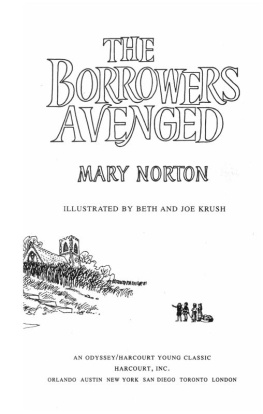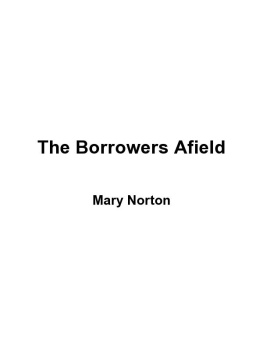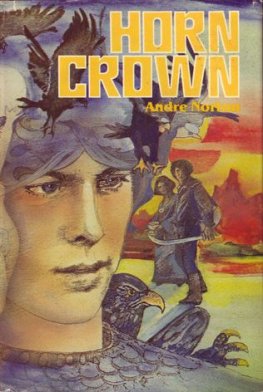
ILLUSTRATED BY BETH AND JOE KRUSH
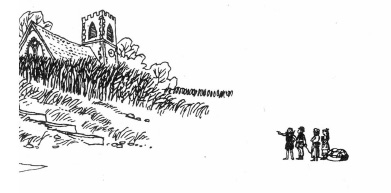
AN ODYSSEY/HARCOURT YOUNG CLASSIC
HARCOURT, INC.
ORLANDO AUSTIN NEW YORK SAN DIEGO TORONTO LONDON
Text copyright 1982 by Mary Norton
Illustrations copyright 1982 by Beth and Joe Krush
All rights reserved. No part of this publication may be reproduced
or transmitted in any form or by any means, electronic or mechanical,
including photocopy, recording, or any information storage and retrieval
system, without permission in writing from the publisher.
Requests for permission to make copies of any part of the work should be
mailed to the following address: Permissions Department, Harcourt, Inc.,
6277Sea Harbor Drive, Orlando, Florida32881-6777.
www.HarcourtBooks.com
First Harcourt Young Classics edition 1998
First Odyssey Classics edition 1990
First published 1982
Library of Congress Cataloging-in-Publication Data
Norton, Mary.
The Borrowers avenged/Mary Norton; illustrated by Beth and Joe Krush.
"An Odyssey/Harcourt Young Classic."
Sequel to: The Borrowers aloft.
Summary: Escaping from an attic where they had been held captive over the long,
dark winter, a family of tiny people sets up house in an old rectory.
[1. Fantasy.] 1. Krush, Beth, ill. II. Krush, Joe, ill. III. Title.
PZ7.N8248Bm 1982 [Fic] 82-41931
ISBN 0-15-210530-1 ISBN 0-15-204131-X (pb)
Printed in the United States of America
9 11 13 15 14 12 10
MP5 7 8 6 4(pb)
To Sophie Phipps, my goddaughter
Chapter One
Mr. Pomfret, the village constable at Little Fordham, was a thin young man with very soft, brown eyes (Miss Menzies often said he looked "wistful").
"Sometimes, I think," she would say to Mr. Pott, "that Mr. Pomfret does not really much like being a policeman."
He was married to a small, bustling womanas fair as he was darkand they had one very large, quiet baby.
The window sills of the flat above the police station were always strewn with furry toys. Miss Menzies usually found this disarming, but as she walked down the path on this particular drizzly autumn afternoon (October 3, 1911, to be exact), the glassy-eyed teddy bears and lop-eared rabbits staring down through the panes above somehow failed to comfort her. For some reason, her errandwhich two days before had appeared the only right and sensible coursesuddenly seemed less so. She felt a little shaky as she put out her hand towards the bell: dear Mr. Pomfret had always been so kind, she dreaded now to forfeit his respect. Yet what she had to tell him was perfectly honest and straightforward. She pulled back her shoulders, regaining some of her courage, and pushed the bell.
It was Mrs. Pomfret who opened the door, a little flushed, her hair awry. "Oh, Miss Menzies, come in, do. You want to see my husband?"
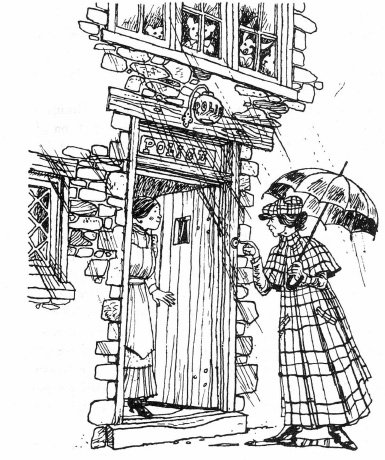
A clotheshorse stood by the stove in the public side of the office; it was hung with diapers, steaming in the glow. Mrs. Pomfret whisked this shut. "Not much of a drying day," she explained apologetically as she made for an inner door.
"Do leave it," said Miss Menzies, but Mrs. Pomfret had gone.
Miss Menzies carefully closed her umbrella and stood it beside the hearth. As she stretched out her hands to the fire, she noticed they trembled slightly. "Oh, dear, oh, dear..." she muttered; and thrusting them deep in her pockets, she squared her shoulders again.
Mr. Pomfret entered, quite cheerfully for him. Disturbed in the middle of his tea, he was wiping his mouth on his handkerchief. "Good afternoon, Miss Menzies. Dreadful weather!"
"Yes, indeed," said Miss Menzies faintly.
"Do sit down. Here, by the fire."
Wordlessly, Miss Menzies sat down. Mr. Pomfret drew a chair from the far side of the desk and joined her by the stove. There was a short silence, then Mr. Pomfret went on. "Thought it might clear up around dinner time ... quite a bit of blue sky" The silence continued, and Mr. Pomfret repeated, "around dinner time," then hurriedly blew his nose. "The farmers like it, though," he went on, stuffing his handkerchief into his pocket. Very cheerful and casual, he seemed.
"Oh, yes," agreed Miss Menzies nervously, "the farmers like it." She moistened her lips with her tongue, staring across the hearth at his kind, brown eyes as though beseeching them to be even kinder.
In the ensuing silence, Mrs. Pomfret bustled in again with a cup of milky tea, which she set on a stool by Miss Menzies. "Oh, how very kind," gasped Miss Menzies as Mrs. Pomfret bustled out again.
Miss Menzies stared thoughtfully at the tea, then taking up the spoon, began very slowly to stir it. At last she raised her eyes. "Mr. Pomfret," she said, in a clear and steady voice, "I want to report a loss. Or it may be a theft," she added as Mr. Pomfret drew out his notebook. She laid down the spoon and clasped her hands together in her lap; the long, thin, curiously girlish face looked grave. "Or missing personsthat might be more accurate." Mr. Pomfret unscrewed the top of his fountain pen and waited politely for her to make up her mind. "In fact," she went on suddenly in a rush, "you might even call it a case of kidnapping!"
Mr. Pomfret became thoughtful, gently tapping his lower lip with his fountain-pen top. "Suppose," he suggested gently, after a moment, "you just tell me simply what happened?"
"I couldn't tell you simply," said Miss Menzies. She thought awhile. "You know Mr. Pott and his model village?"
"Yes, indeed," said Mr. Pomfret. "Quite a tourist attraction." After a short pause, he went on: "They say that Mr. Platter of Went-le-Cray is setting up some kind of model village, too."
"Yes, I heard that."
"A bit more modern-like they say it's going to be, seeing as he's a builder."
"Yes, I heard that, too." Again Miss Menzies ran a nervous tongue across her lips. "Well"she hesitated and then went on boldly"to get back to our village, Mr. Pott's and mine: you know we're sort of partners? That he makes all the houses
and I make the model figuresthe people, as you might say?"
"Yes, indeed, and very lifelike they are, too!"
Miss Menzies's hands tightened slightly as she clasped them together in her lap. "Well, it's like thisI didn't make all the figures. I didn't make the ones that are missing."
Mr. Pomfret managed to look both concerned and relieved at the same time. "Ah, now I see it" He gave a small laugh. "It's some of them that's missing, is it? I thought for a momentI mean, when you said kidnapping"
"That I meant live ones?" She looked at him steadily. "I do."
Mr. Pomfret looked alarmed. "Now, that's different." Very serious suddenly, he poised his pen above his book. "Person or persons?"
"Persons."
"How many?"
"Three. A father, mother, and child."
"Name?" said Mr. Pomfret, writing busily.
"Clock."
"Clock?"
"Yes, Clock."
"How do you spell it?"
"C-L-O-C-K."
"Oh, Clock," said Mr. Pomfret, writing it down. He stared at the word: he seemed puzzled. "Father's occupation?"
Next page
